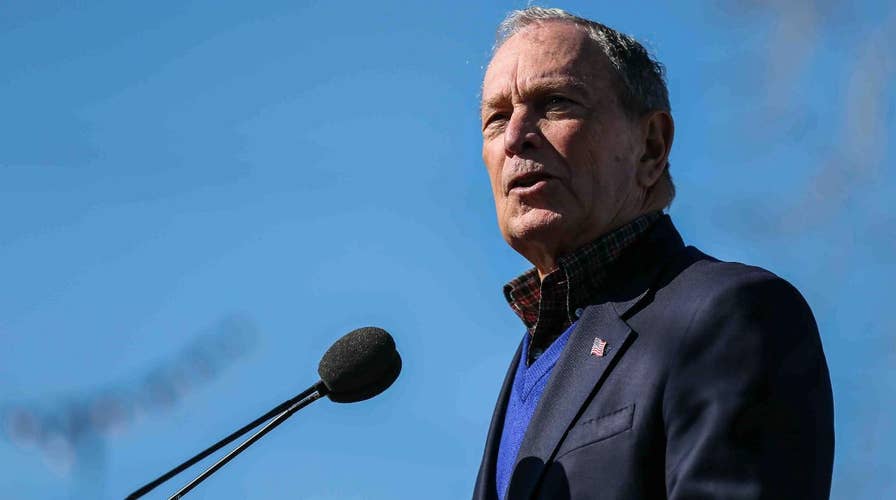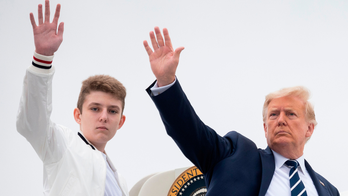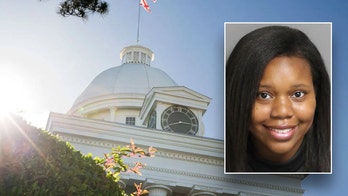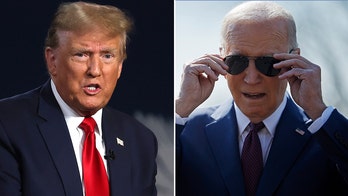Bloomberg open to spending $1 billion on campaign even if he doesn't become nominee
2020 Democrat hopeful Michael Bloomberg says he's willing to spend big bucks to get President Trump out of the White House.
DES MOINES, Iowa -- The Democratic Party chairmen of New Hampshire and Iowa – which together kick off the presidential nominating calendar – are firing back at Mike Bloomberg over the presidential candidate’s new push “to re-order the primary calendar in ways that better reflect our diverse electorate.”
The former New York City mayor and multibillionaire business and media mogul made that call in an op-ed Monday for CNN. He argued that “the two early voting states are unlikely to be consequential in the general election. So as a party, we are spending all of our time and resources outside of the battleground states we need to win.”
And he pledged, if elected, to work with the Democratic National Committee to revamp the primary calendar.
BLOOMBERG'S SPENDING HUNDREDS OF MILLIONS TO RUN CAMPAIGN COMMERCIALS FROM COAST TO COAST
Iowa and New Hampshire – two overwhelmingly white states – have for decades held the first two contests along the road to the White House, attracting plenty of presidential campaign visits in the year leading up to the start of the primaries and caucuses. The small populations in each state have long provided candidates, regardless of their campaign war chests, a level playing field to reach out to voters person-to-person with retail-style politics.
But Iowa and New Hampshire have long faced criticism over their cherished role of leading off the nominating calendar, with the argument that due to their lack of diversity and urban areas, they aren’t reflective of the nation as a whole.
Bloomberg, who jumped into the presidential race late, is skipping campaigning in all four early voting states that hold contests in February -- Iowa, New Hampshire, Nevada and South Carolina. Instead, he’s concentrating immense firepower on the larger delegate-rich states that vote Super Tuesday, which is March 3, and beyond.
BLOOMBERG, TRUMP, TRADE FIRE ON TWITTER OVER BLOOMBERG'S MASSIVE TV AD BLITZ
Shooting back at Bloomberg, Iowa Democratic Party Chairman Troy Price said in a statement:
“Misplacing frustration with your campaign with falsehoods about the early nominating states is a mistake and we are puzzled by Mr. Bloomberg’s comments. Anyone who writes off Iowa as inconsequential in the general election hasn’t paid attention to history. Iowa’s grassroots organizing structure connects candidates directly with swing voters to build our bench."
Longtime New Hampshire Democratic Party Chairman Ray Buckley said earlier Monday that “it seems like Michael Bloomberg is having some second thoughts about his choice not to campaign in South Carolina, Nevada, New Hampshire and Iowa -- and is doing what many candidates in that position have done who are desperate for some press attention.”
“Also, anyone who thinks New Hampshire isn't consequential in the general election must also believe that Al Gore served a term as president of the United States,” Buckley added.
Although they pale compared to larger general election battlegrounds such as Ohio, Michigan, Pennsylvania and Wisconsin, both Iowa and New Hampshire have often been important general election states.
Besides holding the first primary in the nominating calendar, New Hampshire’s also one of around a dozen battleground states up for grabs in the general election every four years. President Trump lost New Hampshire’s four electoral votes to Democratic nominee Hillary Clinton by less than 3,000 votes in the 2016 election, the smallest margin by popular vote of any of the 50 states.
If then-Vice President Gore had won New Hampshire – he narrowly lost the state to George W. Bush by just over 1 percent – he would have won the White House.
Iowa also saw close contests for president in the 2000, 2004 and 2012 presidential elections, but Trump topped Clinton by nearly 10 percent in 2016 in the state.
THE LATEST FROM FOX NEWS ON THE 2020 CAMPAIGN
Bloomberg highlighted in his opinion piece that Iowa and New Hampshire “are among the most homogeneous in the nation. While it’s great that candidates reach out to voters in these states at every pancake breakfast and town hall around, what about African-American, Latino, Asian American, Pacific Islanders, and other voters in places like Detroit, Montgomery, Phoenix, and Houston?”
Bloomberg argued that technological advances like social media are giving all presidential candidates accessibility in larger states that was once out of reach to many contenders.
“The traditional justification for giving two small states so much influence is that larger states require more money. But with social media platforms and cable news, there are few barriers to getting a message out -- that's why more than two dozen Democrats entered the race,” Bloomberg said.
And he pledged that "as president, I will ensure the DNC works with state party leaders at every level to re-order the primary calendar in ways that better reflect our diverse electorate and channel more resources into the states we actually need to win in November."
Bloomberg isn’t the only candidate this cycle to call for Iowa and New Hampshire to lose their primary status. Former San Antonio Mayor and former Housing Secretary Julian Castro, who was the only Latino in the Democratic field, also repeatedly called for the states to lose the position at the front end of the nominating calendar. Castro ended his White House bid earlier this month.
Bloomberg did say at the end of his op-ed: “Don’t get me wrong: I have enormous respect for the voters of Iowa and New Hampshire. Both states are full of devoted citizens. But so are the other 48.”
Bloomberg’s new stance seems to be a shift from last week.
Campaigning in Ohio on Jan. 8, Bloomberg said “I think we’ve got a tradition here of four states … they work very hard. They love the attention. The system has gotten used to it. And I guess the Democratic Party probably shouldn’t take it away.”
But this past weekend, Bloomberg seemed to discount the results in the early voting states in an exclusive interview with Fox News.
"I don't know that it really means anything other than if they win. They get the votes from that state with the delegates to the DNC convention. Does that have an impact on other states? It used to, but I don't think it does anymore,” he said.
Fox News' Kelly Phares contributed to this report.





